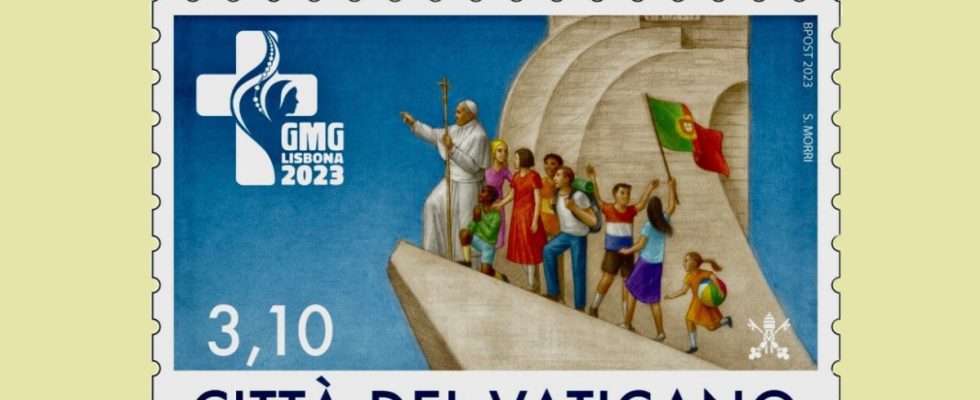It could have been a good subject: Pope Francis leading a group of cheerful children dynamically, right leg in front, arm outstretched. The Pope keeps his eyes on the horizon, his left hand resting on the ferula, the staff with the cross. The children behind him appear to be from all over the world, one waving a Portuguese flag, another chasing after him with a ball.
The Italian illustrator Stefano Morri drew a jolly crowd around the head of the church. Morri has often designed stamps for the Vatican, the Principality of Monaco and the Republic of San Marino. This time, however, Morri was extremely clumsy, according to the unanimous opinion of many Portuguese.
Carlos Moreira Azevedo, for example, describes the stamp’s motif as “extremely tasteless”. Azevedo is Portuguese Curial Bishop in the Vatican and Delegate of the Pontifical Committee for Historical Studies.
The monument in Lisbon, erected in 1960.
(Photo: Imago)
Apparently no one had asked him when it came to issuing a stamp in Lisbon ahead of World Youth Day in early August. Azevedo would probably have advised against this motive. Because illustrator Morri was inspired, the thought makes sense, by one of the most important sights of the Portuguese capital: the Padrao dos Descobrimentos, the Monument to the Discoveries. It is in the Belém district, not far from the Jeronimos Monastery (another tourist magnet), on the banks of the Tagus River.
Some Portuguese are calling for the monument to be destroyed
What neither the illustrator nor his clients in the Vatican may have been aware of: the Monument to the Discoveries is considered quite controversial in today’s Portugal.
Just two years ago, the pugnacious socialist MP Ascenso Simões attracted attention by demanding that the huge monument be torn down. “In a respectable country, the monument should actually be destroyed,” Simões said, triggering a debate. This flared up again a short time later when the base of the monument was marred by graffiti in the summer of 2021: Is nothing sacred to today’s youth?
From the point of view of the critics, the Monument to the Discoveries is an example of a highly questionable handling of Portugal’s colonial past. The work shows conquerors and missionaries such as Ferdinand Magellan, Vasco da Gama, Francisco de Xavier and Pedro Álvares Cabral, the discoverer of Brazil. First and foremost is Henry the Navigator, who commissioned the voyages of discovery and was jointly responsible for the world-changing European expansion efforts – and for the suffering they caused in the colonies.
Henry the Navigator or Infante Dom Henrique, as he is called in Portugal, was a national hero, especially for the dictator António de Oliveira Salazar, who should be honored. Salazar had the monstrous structure built in 1960, on the 500th anniversary of Henry’s death. It was meant to commemorate the days when Portugal was still a world power and to uphold a pride that the regime of the Estado Novo, the “New State”, sought to derive from the country’s colonial history.
Portugal is working on its colonial history – in spite of the prime minister
In the place of that national hero Heinrich, the Italian illustrator put the pope, of all people. According to Curial Bishop Carlos Azevedo, “Pope Francis certainly does not identify with this nationalistic image,” after all it contradicts “universal brotherhood.” After all, the Argentine pope himself is from the New World.
At Vatican News it was said about the new stamp that the Pope was leading young people standing on Peter’s boat, “just as Henry the Navigator led his team when they discovered the new world”. So there is little critical historical awareness here either.
It is the story of a misunderstanding that, however, met with little indulgence in Portugal. Unlike Spain, for example, Portugal has already made good progress in coming to terms with its colonial past. The discourse is driven not least by the Portuguese, who themselves come from the former colonies and are now involved in non-governmental organizations and associations.
Although that doesn’t apply to everyone: Prime Minister António Costa’s family also comes from a former colony, from Goa. Costa himself, however, always emphasizes that his origin is irrelevant. He belongs to a different generation than the most active, who now complained about the papal stamp.
The Vatican responded promptly to their criticism: the stamp was withdrawn from circulation after it was only presented last week. Portuguese media reports that a new motif will appear soon.

